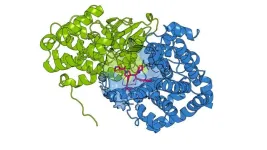(Press-News.org) Researchers at the University of Arizona Health Sciences and the Instituto Nacional de Salud Pública in Mexico are using a $2.2 million National Institutes of Health grant to explore the link between infertility and long-term health issues among Hispanic women of Mexican heritage.
According to recent research, female infertility is often associated with greater risks of cancer, cardiovascular disease and premature mortality. Hispanic women are up to 70% more likely to experience infertility than white women, yet little is known about their long-term health.
“Hispanics are the largest minority group in the United States, and 60% of Hispanics have Mexican heritage. We need to know more about infertility and related health risks in this group,” said Leslie Farland, ScD, an associate professor at the Mel and Enid Zuckerman College of Public Health and member of the U of A Cancer Center who is collaborating with Dalia Stern, PhD, of the Instituto Nacional de Salud Pública to lead the study. “We hope this project is the first step toward personalized screening recommendations that improve women’s health and lengthen women’s lives.”
Researchers hope to determine the risk of breast cancer and gynecological cancers, including endometrial and ovarian cancer, for women with a history of infertility compared with those who have given birth.
They also will investigate the risk of heart disease and premature mortality for women with a history of infertility.
The goal of the study, which is co-funded by the Eunice Kennedy Shriver National Institute of Child Health and Human Development and the Office of Research on Women's Health, divisions of the National Institutes of Health, is to inform personalized care strategies for millions in this population and improve health outcomes through early screenings and interventions.
Farland said existing research on infertility and long-term health outcomes among Hispanic women is sparse. Among the studies that have been conducted, there are key limitations, such as short follow-ups, small sample sizes and a lack of detailed information on infertility histories, diagnoses and treatments.
She has been collaborating with the Instituto Nacional de Salud Pública since 2016, including using data from the Mexican Teachers’ Cohort study. More than 115,000 women enrolled in the Mexican Teachers’ Cohort study in 2006 and are still providing data 18 years later.
“Research on this topic requires large samples with detailed, longitudinal data,” Farland said. “It can only be accomplished by bringing together international experts and data sources.”
“I’m very proud of the research Dr. Farland does on women’s health,” said Iman Hakim, MD, PhD, dean of the Zuckerman College of Public Health. “This collaborative study is another example of her smart, insightful approach. We are especially pleased to be working with the Instituto Nacional de Salud Pública to gather data on infertility that will benefit millions of women in both countries and around Arizona.”
The research team also includes U of A Cancer Center members Denise Roe, DrPH, a professor of biostatistics at the Zuckerman College of Public Health, and John Ruiz, PhD, a professor in the U of A College of Science’s Department of Psychology and the Cancer Center’s associate director of inclusivity, diversity, equity and accessibility.
This research is co-funded by the National Institute of Child Health and Human Development and the Office of Research on Women's Health, divisions of the National Institutes of Health, under award No. R01HD114871.
END
Study of infertility, health among women of Mexican heritage funded by $2.2M NIH grant
A cross-border research project will seek to identify Hispanic women at risk of developing chronic diseases who may benefit from early screenings or interventions.
2024-10-01
ELSE PRESS RELEASES FROM THIS DATE:
Airborne plastic chemical levels shock researchers
2024-10-01
A new study documents how Southern Californians are chronically being exposed to toxic airborne chemicals called plasticizers, including one that’s been banned from children’s items and beauty products.
Plasticizers are chemical compounds that make materials more flexible. They are used in a wide variety of products ranging from lunchboxes and shower curtains to garden hoses and upholstery.
“It’s not just for drinking straws and grocery bags,” said David Volz, environmental sciences professor at UC Riverside, ...
DOD awards $9M for snowpack and meltwater research and Arctic training program in Alaska and New England
2024-10-01
The Department of Defense (DOD) has awarded a $9 million contract to the University of Maine for research that will significantly expand efforts to quantify snowpack properties, explore the impact of snowmelt on the surrounding terrestrial environments of Alaska and Maine, and expand training opportunities in polar science.
The project is led by School of Earth and Climate Sciences and Climate Change Institute faculty member Seth Campbell, who will collaborate with more than a dozen other scientists from UMaine and other institutions. The effort builds on a related and existing ...
SETI Institute awards education grant through the STRIDE program
2024-10-01
SETI Institute Awards Education Grant through the STRIDE Program
October 1, 2024, Mountain View, CA – The SETI Institute awarded its first education grant through its Support Technology, Research, Innovation, Development and Education (STRIDE) program. The grant supports a new project called Encountering Stars in an Inflatable Planetarium, which will offer immersive astronomy and astrobiology experiences for elementary and middle school students in low-income areas and high school and adult audiences interested in STEM-related experiences. The program also includes a training workshop for K-12 teachers ...
NYU Historian Jennifer L. Morgan wins 2024 MacArthur “Genius Grant”
2024-10-01
New York University historian Jennifer L. Morgan, whose work focuses on the institutionalization of race-based slavery in early America and the Black Atlantic, has been named a 2024 MacArthur Fellow by the John D. and Catherine T. MacArthur Foundation.
MacArthur Fellows are recipients of the foundation’s “genius grants,” who each receive $800,000 over a five-year period to pursue intellectual, social, and artistic endeavors.
“The 2024 MacArthur Fellows pursue rigorous inquiry with aspiration and purpose,” says MacArthur Fellows Director ...
Research in 4 continents links outdoor air pollution to differences in children’s brains
2024-10-01
Outdoor air pollution from power plants, fires and cars continues to degrade human, animal and environmental health around the globe. New research shows that even pollution levels that are below government air-quality standards are associated with differences in children’s brains.
A University of California, Davis, research team systematically analyzed 40 empirical studies, the majority of which had found that outdoor air pollution is associated with differences in children’s brains. These differences include volumes of white matter, which is associated with ...
UTA physicists explore possibility of life beyond Earth
2024-10-01
Are there planets beyond Earth where humans can live? The answer is maybe, according to a new study from University of Texas at Arlington physicists examining F-type star systems.
Stars fall into seven lettered categories according to their surface temperature. They also differ in other factors including mass, luminosity, and radius. F-types are in the middle of the scale, hotter and more massive than our sun. F-type stars are yellowish white in color and have surface temperatures of more than 10,000 degrees.
A habitable zone (HZ) is the distance from a star at which water could exist on orbiting planets’ surfaces. In the research led by doctoral student Shaan Patel ...
Seeing double: Designing drugs that target “twin” cancer proteins
2024-10-01
LA JOLLA, CA—Some proteins in the human body are easy to block with a drug; they have an obvious spot in their structure where a drug can fit, like a key in a lock. But other proteins are more difficult to target, with no clear drug-binding sites.
To design a drug that blocks a cancer-related protein, Scripps Research scientists took a hint from the protein’s paralog, or “twin.” Using innovative chemical biology methods, the scientists pinpointed a druggable site on the paralog, and then used that knowledge to characterize drugs that bound to a similar—but more difficult to detect—spot on its twin. Ultimately, they found drugs ...
Fierce names Insilico Medicine as one of its Fierce 50 Honorees of 2024
2024-10-01
Cambridge, MA, Sept. 26, 2024 –Insilico Medicine, a clinical-stage generative AI-driven drug discovery company, announced today that Fierce Life Sciences and Fierce Healthcare have named Insilico Medicine as one of 2024’s Fierce 50 honorees. The Fierce 50 showcases 50 individuals and companies driving advancements in medicine, fostering innovation and shaping the future of biopharma and healthcare.
“The annual Fierce 50 special report highlights individuals and companies that are driving progress in the pharmaceutical, healthcare and biotechnology industries,” said Ayla Ellison, Editor-in-Chief of Fierce Life Sciences and Healthcare. “These 50 outstanding ...
Cleveland Clinic researchers build first large-scale atlas of how immune cells react to mutations during cancer immunotherapy
2024-10-01
A Cleveland Clinic-led research collaboration between Timothy Chan, MD, PhD, Chair of Cleveland Clinic’s Global Center for Immunotherapy, and Bristol Myers Squibb has published the most comprehensive overview to date of how the immune system reshapes tumor architecture in response to immune checkpoint therapy.
The eight-year study, published in Nature Medicine, outlines how cancer immunotherapy induces tumor recognition through neoantigens to reshape the tumor ecosystem. Neoantigens are small peptides produced when cancer cells mutate and are a primary marker for the immune system to recognize cancer cells as different ...
Pioneering quantum computer research continues in Baden-Württemberg
2024-10-01
Utilizing the potential of quantum computers and achieving a real advantage for practical applications — this goal is being pursued worldwide. In Baden-Württemberg, the Competence Center Quantum Computing Baden-Württemberg (KQCBW) has dedicated itself to this goal over the past four years. Great progress has been made in various areas of quantum computing in successful joint projects. The success of the KQCBW is now to be continued and the unique quantum computing ecosystem in the state further expanded.
The KQCBW will be continued in a ten-month transfer project ...
LAST 30 PRESS RELEASES:
USF study: Gag grouper are overfished in the Gulf; this new tool could help
New study from Jeonbuk National University finds current climate pledges may miss Paris targets
Theoretical principles of band structure manipulation in strongly correlated insulators with spin and charge perturbations
A CNIC study shows that the heart can be protected during chemotherapy without reducing antitumor efficacy
Mayo Clinic study finds single dose of non-prescribed Adderall raises blood pressure and heart rate in healthy young adults
Engineered immune cells show promise against brain metastases in preclinical study
Improved EV battery technology will outmatch degradation from climate change
AI cancer tools risk “shortcut learning” rather than detecting true biology
Painless skin patch offers new way to monitor immune health
Children with poor oral health more often develop cardiovascular disease as adults
GLP-1 drugs associated with reduced need for emergency care for migraine
New knowledge on heritability paves the way for better treatment of people with chronic inflammatory bowel disease
Under the Lens: Microbiologists Nicola Holden and Gil Domingue weigh in on the raw milk debate
Science reveals why you can’t resist a snack – even when you’re full
Kidney cancer study finds belzutifan plus pembrolizumab post-surgery helps patients at high risk for relapse stay cancer-free longer
Alkali cation effects in electrochemical carbon dioxide reduction
Test platforms for charging wireless cars now fit on a bench
$3 million NIH grant funds national study of Medicare Advantage’s benefit expansion into social supports
Amplified Sciences achieves CAP accreditation for cutting-edge diagnostic lab
Fred Hutch announces 12 recipients of the annual Harold M. Weintraub Graduate Student Award
Native forest litter helps rebuild soil life in post-mining landscapes
Mountain soils in arid regions may emit more greenhouse gas as climate shifts, new study finds
Pairing biochar with other soil amendments could unlock stronger gains in soil health
Why do we get a skip in our step when we’re happy? Thank dopamine
UC Irvine scientists uncover cellular mechanism behind muscle repair
Platform to map living brain noninvasively takes next big step
Stress-testing the Cascadia Subduction Zone reveals variability that could impact how earthquakes spread
We may be underestimating the true carbon cost of northern wildfires
Blood test predicts which bladder cancer patients may safely skip surgery
Kennesaw State's Vijay Anand honored as National Academy of Inventors Senior Member
[Press-News.org] Study of infertility, health among women of Mexican heritage funded by $2.2M NIH grantA cross-border research project will seek to identify Hispanic women at risk of developing chronic diseases who may benefit from early screenings or interventions.





